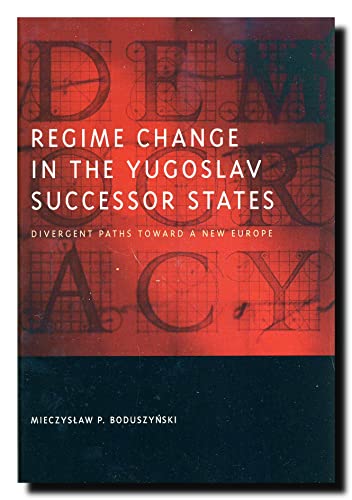Regime Change in the Yugoslav Successor States: Divergent Paths toward a New Europe (Democratic Transition and Consolidation) - Hardcover

Zu dieser ISBN ist aktuell kein Angebot verfügbar.
Alle Exemplare der Ausgabe mit dieser ISBN anzeigen:"This work is a must read for the academic or policy analyst interested in the Balkans."
(Richard P. Farkas Slavic Review)"A comprehensive analysis of the evolution of the Western Balkans. It provides a well-grounded argument, free from ideological considerations, allowing for a solid understanding of both the transition period and the current status of the case studies."
(Ines Sofia de Oliveira Journal of Common Market Studies)"A valuable book."
(Dusan Pavlovic East European Politics and Societies)"Boduszyński, however, does not fall into the trap of historical determinism, and puts less emphasis on historical legacies of rule of law or democracy than on different levels of economic development."
(Perspectives on Politics)"Mieczysław P. Boduszyński's book is to be recommended to all those who analyse political changes in the 1990s. It offers interesting and rather useful methodological tools for comparative analysis of transition in war torn-countries. In addition, it helps us to understand the motives and actions by political elites in the post-Yugoslav states during the first decade since their independence. This book will also be useful to researchers of further transformation of these societies."
(Dejan Jovic Croatian Political Science Review)In the 1990s, amid political upheaval and civil war, the Socialist Federal Republic of Yugoslavia dissolved into five successor states. The subsequent independence of Montenegro and Kosovo brought the total number to seven. Balkan scholar and diplomat to the region Mieczysław P. Boduszyński examines four of those states―Croatia, Slovenia, Macedonia, and the Federal Republic of Yugoslavia―and traces their divergent paths toward democracy and Euro-Atlantic integration over the past two decades.
Boduszyński argues that regime change in the Yugoslav successor states was powerfully shaped by both internal and external forces: the economic conditions on the eve of independence and transition and the incentives offered by the European Union and other Western actors to encourage economic and political liberalization. He shows how these factors contributed to differing formulations of democracy in each state.
The author engages with the vexing problems of creating and sustaining democracy when circumstances are not entirely supportive of the effort. He employs innovative concepts to measure the quality of and prospects for democracy in the Balkan region, arguing that procedural indicators of democratization do not adequately describe the stability of liberalism in post-communist states.
This unique perspective on developments in the region provides relevant lessons for regime change in the larger post-communist world. Scholars, practitioners, and policymakers will find the book to be a compelling contribution to the study of comparative politics, democratization, and European integration.
„Über diesen Titel“ kann sich auf eine andere Ausgabe dieses Titels beziehen.
- VerlagJohns Hopkins University Press
- Erscheinungsdatum2010
- ISBN 10 0801894298
- ISBN 13 9780801894299
- EinbandTapa dura
- Anzahl der Seiten360
(Keine Angebote verfügbar)
Buch Finden: Kaufgesuch aufgebenSie kennen Autor und Titel des Buches und finden es trotzdem nicht auf ZVAB? Dann geben Sie einen Suchauftrag auf und wir informieren Sie automatisch, sobald das Buch verfügbar ist!
Kaufgesuch aufgeben